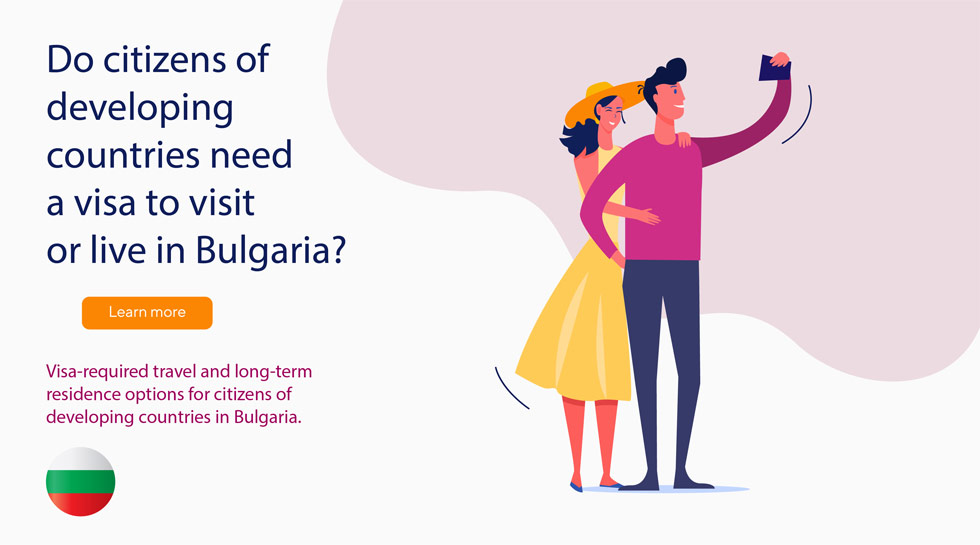Yes – if you are from a developing country (i.e., a country whose citizens are not on the visa-free list), you must obtain a visa to enter Bulgaria even for short stays (MFA). For long-term residence in Bulgaria, you will need a Type D long-stay visa and a residence permit, similar to other non-EU nationals. Still, the process may be more involved due to additional requirements and scrutiny.
Bulgaria follows the EU’s standard visa policy. Nationals of countries classified as “developing” in this context typically refer to countries outside the EU/EEA/Switzerland that do not have a visa waiver agreement with the EU. These include most of Asia, Africa, the Middle East, and parts of Latin America. For example, citizens of India, China, Nigeria, South Africa, Pakistan, and Russia (and many others) need visas to enter Bulgaria. The official list of visa-required countries is provided in Annex I of EU Regulation 2018/1806, and Bulgaria fully applies this list (mfa.bg). Suppose you hold a passport from one of these countries. In that case, you must apply for a short-stay Schengen Visa (Type C) at a Bulgarian embassy/consulate (or a Schengen visa from another EU country) before you can travel to Bulgaria for tourism, family visits, or business. A Bulgarian C visa typically allows stays of up to 90 days within 180 days in Bulgaria. Since 2024, Bulgaria has issued Schengen uniform visas, meaning a Bulgarian-issued short visa is valid throughout the Schengen area as well (mfa.bgmfa.bg). Conversely, suppose you have a valid multiple-entry Schengen visa or residence permit from another Schengen country. In that case, Bulgaria accepts that for entry and short stays, you wouldn’t need a separate Bulgarian visa for a visit to Bulgaria. (Do note: these rules have been updated because Bulgaria joined the Schengen zone in 2024, so visa regimes are being harmonized.)
For citizens of developing countries who wish to live, work, or study in Bulgaria, the requirements are similar to those for any third-country national, but often with additional steps. You will need to apply for a Type D long-stay visa based on a specific purpose: e.g., a Bulgarian work permit (if you find employment in Bulgaria), university admission, marriage to a Bulgarian, family reunification, investment, etc. The application must be submitted in your home country (or country of legal residence) at a Bulgarian consulate. Expect to provide documents like invitation letters or contracts, proof of funds, proof of accommodation, a clean criminal record certificate, medical insurance, etc. Bulgarian consulates conduct thorough checks, and processing can take up to 1–2 months. Once granted, the Type D visa is usually valid for 6 months and allows a single entry (or sometimes multiple entries) into Bulgaria for the purpose of obtaining your residence permit.
After arriving in Bulgaria on a D visa, you must go to the Migration Directorate to apply for your extended residence permit (this is typically a plastic ID card, often called a “residence card”). If you are coming as, say, a student or an employee, your residence permit will be tied to that status (and you must continue to meet the conditions, like enrollment or employment). Most first-time licenses are issued for one year and can be renewed annually as needed. During your legal stay, it’s essential to obey Bulgarian immigration laws – for instance, always renew your permit on time and do not work on a status that doesn’t allow work (students may have limited work rights; some permits like family reunification allow work without a separate work permit (home-affairs.ec.europa.eu). After 5 years of continuous legal residence, you can apply for permanent residence in Bulgaria. Additionally, certain family-based cases can lead to permanent residence in a shorter timeframe (for example, unmarried children of Bulgarian citizens and parents of Bulgarian citizens may qualify in fewer years, as per home-affairs.ec.europa.eu).
If you are from a country that requires a visa, you need to plan for any trip to Bulgaria:
- Short-term visit = Bulgarian/Schengen C visa
- Long-term relocation = D visa + residence permit
Always check the official Bulgarian MFA visa list to see your country’s status. The process for developing country nationals can be complex, but Bulgaria offers many pathways (work, study, investment, etc.) to obtain legal residence if the requirements are met.
More Information:
- Official Visa Regime List – Bulgarian MFA: “Information about the Visa Regime for Foreigners with Ordinary Passports” – outlines which countries’ citizens need visas and the rules for short stays – Web: MFA. Includes details on visa application requirements and documents.
- EU Immigration Portal – Bulgaria: Information on family reunification and other procedures in Bulgaria for non-EU nationals, as provided by the European Commission – Web: home-affairs.ec.europa.eu and home-affairs.ec.europa.eu.
You Will Also Like To Know About:
- Does Bulgaria have a Digital Nomad Visa for remote workers?
- Can family members of Bulgarian citizens live in Bulgaria long-term?
- Do UK nationals need a visa to live in Bulgaria after Brexit?
Legal Disclaimer: The information in this article (part of the Stay in Bulgaria FAQ series—EU/EEA/Swiss citizens, UK nationals, third-country nationals, citizens of developing countries, digital nomads, and family members of Bulgarian citizens) is for general informational purposes only and does not constitute legal advice. It does not create an attorney-client relationship. Laws and procedures (including Schengen/90-day rules, Type D visas, residence permits, and related EU/Bulgarian regulations) are subject to frequent changes; therefore, content may be incomplete or out of date. External links are provided for convenience; we are not responsible for their content. For advice tailored to your situation, consult the Migration Directorate (Ministry of Interior), the Ministry of Foreign Affairs, or a licensed immigration attorney. Last Updated: September 2025.



